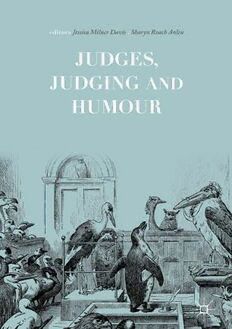
Judges, Judging and Humour PDF
350 Pages·2018·6.747 MB·English
Most books are stored in the elastic cloud where traffic is expensive. For this reason, we have a limit on daily download.
Preview Judges, Judging and Humour
Description:
This book examines social aspects of humour relating to the judiciary, judicial behaviour, and judicial work across different cultures and eras, identifying how traditionally recorded wit and humorous portrayals of judges reflect social attitudes to the judiciary over time. It contributes to cultural studies and social science/socio-legal studies of both humour and the role of emotions in the judiciary and in judging. It explores the surprisingly varied intersections between humour and the judiciary in several legal systems: judges as the target of humour; legal decisions regulating humour; the use of humour to manage aspects of judicial work and courtroom procedure; and judicial/legal figures and customs featuring in comic and satiric entertainment through the ages.Delving into the multi-layered connections between the seriousness of the work of the judiciary on the one hand, and the lightness of humour on the other hand, this fascinating collection will be of particular interest to scholars of the legal system, the criminal justice system, humour studies, and cultural studies.
See more
The list of books you might like
Most books are stored in the elastic cloud where traffic is expensive. For this reason, we have a limit on daily download.
